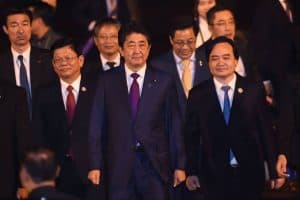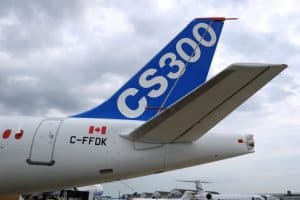
Japanese Prime Minister Abe played a key role in keeping the Trans-Pacific Partnership alive after the US withdrew. President Trump is now reconsidering. Hopefully, the US and the other eleven TPP nations can come to an agreement, for both economic and strategic reasons (thwarting Chinese imperialism in the Pacific).
The most important news of the day is that President Trump said he is considering rejoining the Trans-Pacific Partnership (TPP-11), the eleven nations that just a few days ago announced that they had secured agreement to go ahead with their trade pact. Of the US press, only the Wall Street Journal covered this major development. We quote excerpts:
President Donald Trump said Friday his administration was open to joining a new version of the Pacific Rim trade bloc he has long derided as unfair to the U.S.
“We would consider negotiating” with the 11 members of the Trans-Pacific Partnership “either individually or perhaps as a group, if it is in the interests of all,” Mr. Trump said in a speech to the World Economic Forum in Davos, Switzerland.
Even with the conditions and hedges, the statement marks a major change for the president….
The [TPP] pact includes some of America’s largest trading partners, such as Japan, Canada, and Mexico, and some of the world’s fastest-growing economies, such as Vietnam and Malaysia.
Many U.S. businesses have worried that the creation of a new Pacific trade bloc without the U.S. would cost them sales in everything from beef to autos, as competitors inside the bloc become able to sell to those markets at reduced tariffs and under harmonized rules.
The failure of the mainstream press (New York Times, Washington Post) to cover this major development underlies its status as a collection of purveyors of Democratic Party press releases, not news. Headlines of the New York Times as we file this story make the point: “Editorial: Why Does President Trump Fear the Truth?” — “Kristof: Trump Leads the World, Backward” — “NEWS ANALYSIS: Gridlock Deepens Under Trump. Is Our Democracy at Risk?” So too the Washington Post. Instead of the Pacific trade story: “2017 was bad. It may have been Trump’s high point. By Colbert I. King” — “What are you hiding [of collusion with Russia], Mr. President? By Kathleen Parker” —
ITC supports Bombardier over Boeing

Bombardier’s fuel-efficient C-series midrange plane
A second major development also went unreported in the mainstream press: the ruling by the US International Trade Commission in favor of Canada’s Bombardier and against Boeing. The Wall Street Journal again was the only major news daily to run the story:
Boeing Co. suffered a bruising defeat after a U.S trade panel Friday rejected its complaint of being harmed by Bombardier Inc., effectively blocking a Trump administration proposal for steep tariffs against the Canadian jet maker….
The U.S. International Trade Commission, an independent body, on Friday rejected Boeing’s claim that Bombardier unfairly won a big sale of its new line of jets to Delta Air Lines Inc. with illegal support from Canada’s government.
Compounding the scandal of the mainstream press not covering either President Trump’s change of heart on the Trans-Pacific Partnership or the USITC’s ruling against Boeing, the news also received no coverage from the pro-Trump press, such as Breitbart, The Daily Caller, and Drudge Report. By contrast, Founders Broadsheet, which regards itself as supportive but not uncritical of the President, was unique among the smaller online press in covering the Boeing – Bombardier story: here and here. We value covering important news, especially important neglected news, over confining coverage to just the partisan issues du jour.
An IMF official weighs in
A third development, again unreported in all but the Wall Street Journal: the statement at Davos by the International Monetary Fund’s number two official, David Lipton, backing Trump on China. According to the Journal’s columnist on the scene:
[S]ome Trump administration complaints about unfair trade are valid, as he urged the rest of the world, in particular China, to take note.
[W]hile there’s nothing inherently wrong with bilateral trade deficits, “unwarranted” deficits driven by “distortive” or “unfair” trade practices are a problem.
“The U.S. is making the complaint that there are such undesirable policies. As a complaint that deserves to be heard.” He noted that in both the U.S. and Europe, unhappiness with globalization has generated political upheaval. “The rest of the world, whose future really depends on openness and integration, had better be open to dealing with those concerns and complaints or else it will be really hard to have a globalization that’s durable.”
US economy likely to see strong capital investment in 2018
Despite the claim by one of the Washington Post’s resident hacks, Colbert I. King, that “2017 was bad. It may have been Trump’s high point,” the outlook for the US economy in 2018 and beyond is quite promising. With labor shortages developing and a five-year period of full expensing (vs. prolonged amortization) for most capital expenditures under the new tax reform bill, industry is planning major investments in productivity-enhancing capital goods. Up until the tax bill was passed at the end of the year and went into effect on January 1st, industry held off such investments because of uncertainty about taxes, plus the availability until then of relatively inexpensive labor. The tax reform bill has not only made possible well-publicized wage increases but also created incentives to reduce labor expenses by investing in new automation equipment. This should end the US productivity stagnation of previous years.
Click here to go to the previous issue of Founders Broadsheet (“Immigration fight: US to be Founders’ constitutional republic or Democrats’ Brave New World welfare state?”)

Leave a Reply